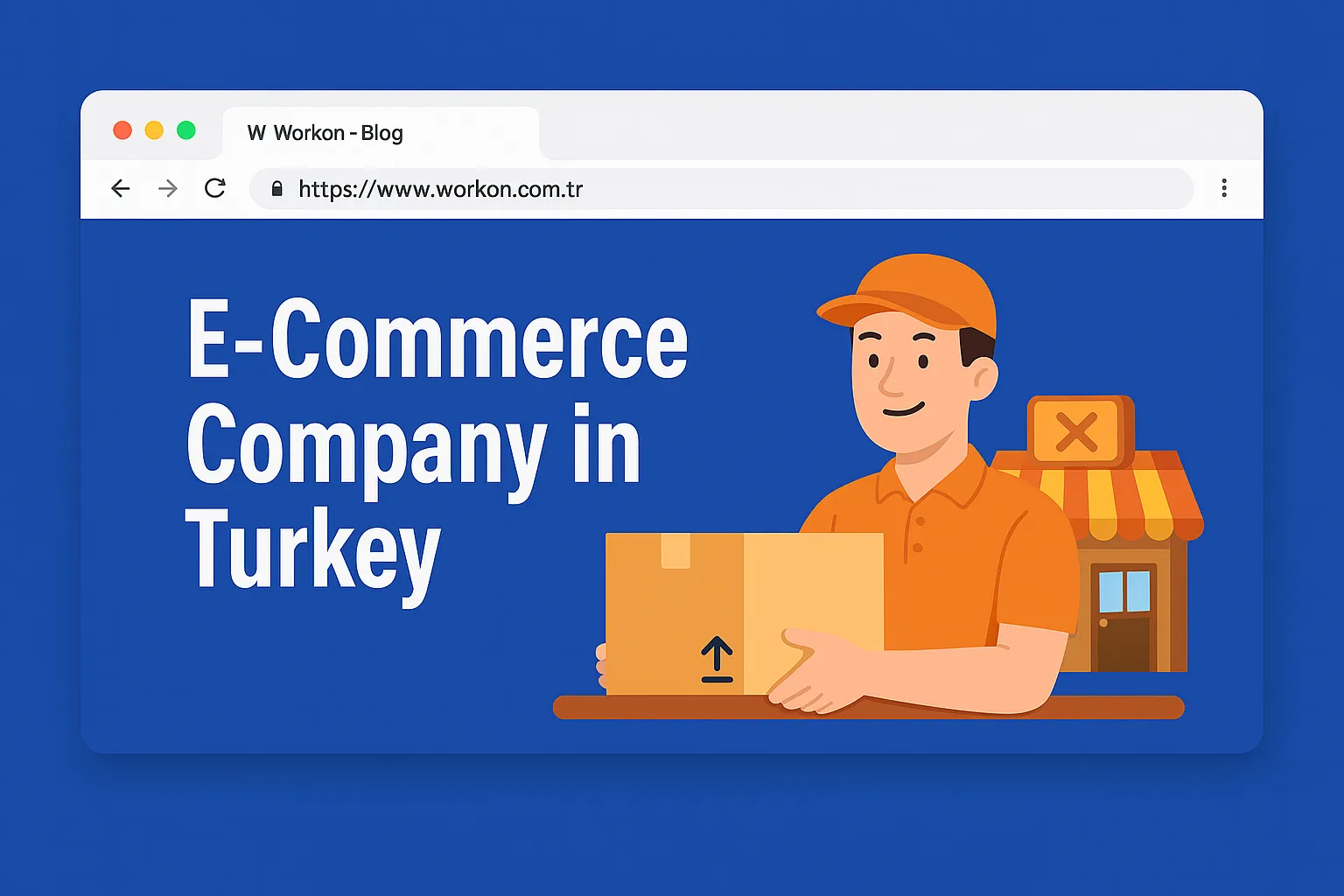Navigating Turkey’s Booming E-commerce Landscape

Turkey’s e-commerce sector is experiencing remarkable growth, presenting exciting opportunities for entrepreneurs in 2025. Businesses seeking to establish a robust online presence will find this dynamic market particularly attractive. Several key factors are fueling this upward trajectory, including shifting consumer preferences and rapid technological advancements. This creates a fertile ground for innovative online businesses.
Key Drivers of Growth
A primary driver of this growth is the increasing internet and smartphone penetration throughout Turkey. Greater connectivity enables consumers to easily access online marketplaces and engage in digital transactions. The widespread adoption of mobile payment solutions like Apple Pay and Google Pay has made online shopping increasingly convenient. This is especially relevant in Turkey, where mobile commerce is gaining significant traction.
Another key factor is the evolution of consumer behavior. Turkish consumers are increasingly drawn to online shopping for its convenience, broader product selection, and competitive pricing. This shift in mindset creates a demand for diverse online products and services, further fueling the growth of the e-commerce market. Businesses that can effectively cater to these evolving needs are poised for success.
Turkey’s Strategic Position
Turkey’s unique geographical location, bridging Europe and Asia, provides distinct advantages. This strategic positioning facilitates cross-border trade and access to international markets. E-commerce businesses in Turkey can readily reach customers in both regions, significantly expanding their potential customer base. This logistical strength solidifies Turkey’s role as a major player in the global e-commerce arena.
Niche Opportunities
While Turkey’s e-commerce market is competitive, niche areas offer promising prospects for new businesses. The demand for locally sourced products and artisanal goods is growing. Specialized e-commerce platforms catering to specific demographics or interests also present unique opportunities. Businesses focusing on these niche segments can differentiate themselves and establish a successful market presence. This targeted approach allows for focused marketing and stronger connections with specific customer groups.
Turkey’s eCommerce market is projected to reach US$32.45 billion in 2025, solidifying its position as one of the fastest-growing markets worldwide. This growth is expected to continue, with a CAGR of 10.21% between 2025 and 2029, reaching a market volume of US$47.87 billion by 2029. The Turkish eCommerce sector spans 14 different markets, including retail goods, consumer electronics, and household items. Find more detailed statistics here. This data underscores the immense potential of the Turkish e-commerce landscape for aspiring entrepreneurs. As the market evolves, understanding these key drivers is crucial for building a thriving and sustainable e-commerce business in Turkey.
Mastering the Legal and Registration Framework

Launching a thriving e-commerce business in Turkey depends heavily on a strong grasp of the legal and registration procedures. This includes choosing the right business structure, registering with the proper authorities, and understanding your tax obligations. By carefully navigating these steps, you can ensure your business operates legally and efficiently. This sets the stage for long-term stability and growth in 2025 and beyond.
Choosing the Right Business Structure
One of your first decisions will be selecting the most appropriate business structure for your e-commerce venture. This choice impacts your liability, tax burden, and administrative requirements. Each structure has its pros and cons, so careful consideration is crucial.
The following are a couple of common business structures in Turkey:
- Limited Liability Company (LLC): A popular option for small to medium-sized e-commerce businesses in Turkey due to its relative simplicity and limited liability protection. LLCs generally require less initial capital and have simpler administrative processes.
- Joint Stock Company: This structure is more complex and better suited for larger e-commerce ventures anticipating significant growth and potential investor involvement. While it offers greater scalability, it also carries more stringent regulatory requirements.
For instance, an LLC might be perfect for a small online boutique, while a larger e-commerce platform attracting multiple investors might benefit from a Joint Stock Company. Selecting the right structure aligns with your business’s scale and ambition.
For further information, see our detailed guide on How to open a business in Turkey.
To help you understand the nuances of each business type, we’ve compiled the following table:
Business Structure Comparison for E-commerce in Turkey A detailed comparison of different business entities available for e-commerce entrepreneurs in Turkey.
| Business Type | Minimum Capital | Liability | Formation Time | Foreign Ownership | Tax Implications |
|---|---|---|---|---|---|
| Limited Liability Company (LLC) | Lower | Limited | Relatively quick | Allowed | Corporate income tax, VAT |
| Joint Stock Company | Higher | Limited | Longer | Allowed | Corporate income tax, VAT |
This table provides a high-level comparison. Consulting with a legal professional is always recommended for personalized advice.
Registering Your E-commerce Business
After choosing your business structure, the next crucial step is registering it with the Turkish Trade Registry. This official registration is mandatory for legal operation and builds credibility. A clear and organized approach is essential.
Here’s a breakdown of the registration process:
- Obtain a Potential Tax Identification Number: This is the initial step, providing a temporary identifier during registration.
- Prepare the Required Documents: Gather all necessary documents, which may include articles of association, notarized signatures, and proof of address. Thorough preparation streamlines the process.
- Submit Your Application: Submit your completed application and all supporting documents to the appropriate trade registry office. Accuracy and completeness are vital to prevent delays.
Understanding Tax and E-invoicing Requirements
Successfully navigating Turkey’s tax system is critical for e-commerce businesses. Understanding Value Added Tax (VAT) and e-invoicing regulations is essential for compliance and effective financial management. Overlooking these requirements can result in penalties and legal complications.
Key tax considerations include:
- VAT Registration: Determine if your e-commerce business meets the VAT threshold and register accordingly. This ensures proper tax collection and remittance.
- E-invoicing Integration: Implement a compliant e-invoicing system to manage sales transactions electronically. This streamlines reporting and ensures compliance.
Practical Considerations and Real-World Experiences
Beyond the formal registration steps, practical aspects like securing the necessary permits and licenses can significantly impact your e-commerce operations. Learning from other entrepreneurs’ experiences can be invaluable. Many successful e-commerce businesses in Turkey utilize experienced business service providers to manage these complexities, allowing them to focus on their core business activities while ensuring compliance. These providers often offer customized solutions, including legal, administrative, and financial support. Partnering with such providers gives e-commerce businesses access to expert advice, minimizes administrative burden, and contributes to long-term success in the Turkish market. This collaborative strategy promotes efficiency and compliance.
Decoding Turkish Consumer Behavior
Understanding the Turkish consumer is crucial for any e-commerce venture hoping to thrive in Turkey. This means researching their motivations, preferences, and online behavior. By understanding the Turkish market, businesses can tailor their strategies to connect with local shoppers and build a loyal customer base. This focused approach is essential for long-term success in this vibrant e-commerce environment.
Understanding the Turkish Online Shopper
Turkish consumers, especially younger demographics, are increasingly turning to online shopping. This shift is driven by factors like convenience, access to a wider product range, and competitive pricing. However, trust is paramount. Online security and dependable service are essential. A clear and transparent return policy is vital for attracting cautious buyers.
Regional Variations in Consumer Preferences
Turkey’s diverse regions display distinct consumer behaviors. Istanbul, a cosmopolitan hub, often sets trends, with high expectations for product quality and customer service. Other regions may prioritize affordability and practicality. Understanding these regional nuances is key for effective targeting and maximizing reach across the country. Recognizing these differences leads to more effective marketing campaigns.
The Influence of Mobile Commerce
Mobile commerce dominates in Turkey. With a large percentage of the population under 30, smartphones are the go-to device for online transactions. Optimizing your e-commerce platform for mobile isn’t just a suggestion – it’s a requirement. This caters to the mobile lifestyle of Turkish consumers and ensures a smooth shopping experience. A positive mobile experience can significantly impact your conversion rates.
Check out our guide on Adapting to Turkish Business Culture.
Key Product Categories and Payment Methods
Certain product categories dominate Turkey’s e-commerce market. White goods, electronics, and clothing consistently lead in sales volume. Understanding these trends can inform product selection and inventory management strategies. This allows businesses to leverage existing demand and optimize their product offerings. While modern payment methods like debit/credit cards and digital wallets are common, traditional methods like cash on delivery remain important. Offering various payment options caters to different preferences and builds trust. This flexibility can be a deciding factor for many Turkish shoppers. You might be interested in: How to start an e-commerce company in turkey (2025 guide) The Turkish population reached approximately 85.82 million in 2023 with an internet penetration rate of 83%, fueling the growth of the eCommerce market. Around 50% of internet users shop online, leading to a market value of about €53 billion in 2023. Mobile commerce accounts for 91% of online transactions. Explore this topic further: Learn more about Turkish consumer behavior.
Building Trust and Loyalty
Building strong relationships with Turkish customers requires more than simply offering quality products. Exceptional customer service, localized content, and culturally sensitive marketing campaigns are essential. This fosters a sense of connection and cultivates loyalty. Understanding cultural nuances and communicating effectively can set your business apart. This personalized approach creates a positive brand image and encourages repeat purchases.
Selecting Your Technology Foundation

The technology you select for your Turkish e-commerce venture in 2025 is a critical decision. It will influence everything from website functionality and the customer experience to inventory management and payment processing. Careful evaluation of different platforms and tools is essential to find the best fit for your business needs and objectives.
Key Platform Considerations for the Turkish Market
Selecting the right platform requires a thorough assessment of several key factors. These include market share, setup costs, integration with local Turkish payment gateways, Turkish language support, mobile optimization, and suitability for your business model. These elements will directly impact your ability to effectively reach your target audience, manage operations, and achieve your goals within Turkey.
Understanding the current e-commerce environment in Turkey is essential. As of 2025, Turkey has a vibrant online retail sector with over 100,000 online stores. While WooCommerce boasts a high number of stores, platforms like Custom Cart lead in sales volume. This difference highlights the importance of considering not only a platform’s popularity but also its potential for generating revenue. Learn more about Turkish e-commerce platform insights. This nuanced approach will help you make well-informed technology choices.
Comparing Popular E-commerce Platforms
Various platforms cater to different business needs and budget constraints. Understanding their strengths and weaknesses is crucial for making the right choice for your e-commerce business in Turkey. Each platform offers distinct features, necessitating a comprehensive comparison.
To help illustrate the key differences, we’ve compiled the following table:
E-commerce Platform Comparison for Turkish Market Comprehensive analysis of major e-commerce platforms available in Turkey with their market share, features, and suitability for different business models
| Platform | Market Share (%) | Average Setup Cost (TRY) | Local Payment Integration | Turkish Support | Mobile Optimization | Best For |
|---|---|---|---|---|---|---|
| WooCommerce | High | Low | Excellent | Good | Good | Startups, SMEs |
| Custom Cart | Medium | Medium | Excellent | Excellent | Excellent | Growing businesses |
| Shopify | Medium | Medium | Good | Moderate | Excellent | Businesses scaling rapidly |
| Magento | Low | High | Good | Moderate | Good | Large enterprises |
This table offers a general overview. Actual costs and features can vary based on individual requirements and customizations. Consulting with a technology expert familiar with the Turkish market can provide tailored recommendations.
Localization and Payment Integrations
Successfully serving the Turkish market requires platform localization. This includes integration with popular Turkish payment gateways like iyzico and PayTR, offering full Turkish language support, and displaying prices in Turkish Lira (TRY). These steps create a seamless and comfortable experience for Turkish customers, fostering trust and simplifying transactions.
Read also: Choosing your workspace: Virtual vs traditional office
Hosting and Security in Turkey
Beyond the platform itself, hosting and security are vital considerations. Selecting a dependable hosting provider with servers in or near Turkey can significantly improve website speed and performance for local users. This ensures a smooth browsing experience. Robust security measures, such as SSL certificates and data encryption, are also crucial for protecting customer data and building trust. These elements are essential for establishing credibility and achieving long-term success in the Turkish e-commerce market.
Creating Seamless Payment and Logistics Systems
For a thriving e-commerce business in Turkey, offering high-quality products is only the first step. Equally important is providing Turkish consumers with dependable payment and delivery options. This is especially critical in Turkey, where consumer trust significantly influences online buying decisions. This section explores building these vital systems, drawing on the success of established Turkish e-commerce companies. This practical approach offers valuable insights for new businesses aiming to succeed in the Turkish market.
Understanding Preferred Payment Methods in Turkey
Turkish consumers use various payment options, and accommodating these preferences is essential for boosting sales. Offering a range of choices, from contemporary digital methods to more traditional ones, is key to reaching a wider customer base.
- Credit and Debit Cards: These remain the most common online payment method in Turkey. Integrating with major card providers like Visa and Mastercard is fundamental. Secure payment processing is a must for maintaining customer confidence.
- Digital Wallets: The use of digital wallets like Apple Pay and Google Pay is steadily increasing, especially among younger consumers. Offering this option simplifies the checkout process, leading to a better customer experience, particularly on mobile devices.
- Cash on Delivery (COD): While its overall popularity is declining, COD remains important for some Turkish shoppers. Providing COD can foster trust, especially for those unfamiliar with online shopping. This method allows customers to examine their order before paying, reducing purchase hesitation.
- Bank Transfers (EFT): Bank transfers are a preferred method for some, especially for high-value purchases. Providing clear EFT payment instructions is essential for a seamless transaction and positive customer experience.
Navigating Logistics and Inventory Management
Efficient logistics are vital for on-time deliveries, especially in a geographically diverse nation like Turkey. Consider these key aspects:
- Warehouse Location Strategies: Choosing the right warehouse locations can significantly influence delivery times and expenses. Strategic placement near major city centers like Istanbul, Ankara, and Izmir can speed up deliveries. Consider utilizing multiple warehouses for wider reach and efficient order processing throughout Turkey.
- Last-Mile Delivery Partnerships: Collaborating with trustworthy local delivery services is crucial. Negotiating competitive rates with these companies helps balance cost and dependability. Look for providers offering thorough tracking information and reliable service across Turkey.
- Managing Customs for Imported Products: If your e-commerce business involves importing goods, understanding Turkish customs regulations is a necessity. Engaging a customs broker can streamline the process and minimize delays or difficulties. This proactive approach ensures smooth operations and avoids supply chain disruptions.
Returns Management and Optimization
Returns are an unavoidable part of e-commerce. Managing them effectively can transform a potentially negative experience into a positive one. Consider the following:
- Implementing a Clear and User-Friendly Return Policy: Turkish consumers value straightforward return policies. A hassle-free return process builds confidence and strengthens customer loyalty, encouraging repeat purchases.
- Optimizing Reverse Logistics: Handling returned items efficiently can substantially impact profitability. Collaborating with dependable reverse logistics providers can simplify this process, minimizing expenses and maximizing efficiency. This approach improves overall operational effectiveness.
Building efficient payment and logistics systems adapted to the Turkish market is essential for e-commerce success. By understanding local payment preferences and addressing the logistical challenges of this diverse country, you can create a system that attracts and retains customers. This investment in essential systems lays the foundation for sustained growth in Turkey’s expanding e-commerce sector. This focused approach will help you resonate with Turkish shoppers and position your company for long-term success. For more on how Workon can assist you in starting your e-commerce business in Turkey in 2025, visit Workon.
Capturing the Turkish Market Through Strategic Marketing
Successfully launching an e-commerce company in Turkey in 2025 requires a deep understanding of the Turkish market and strategic marketing efforts. Simply translating existing materials isn’t enough; you need to genuinely engage with the local culture and consumer preferences. By focusing on culturally relevant content and utilizing the right platforms, you can effectively connect with Turkish shoppers. This targeted approach is essential for succeeding in a competitive market.
Understanding the Turkish Digital Landscape
Turkish consumers are very active online, particularly on social media platforms. However, some platforms are more effective than others. Instagram and YouTube are especially popular, making them excellent channels for reaching your target demographic. Facebook also maintains a strong presence. These platforms provide valuable opportunities to build brand awareness and interact directly with your audience.
Focusing on these key platforms maximizes your reach and connects you with potential customers where they already spend their time. Also, consider the importance of mobile optimization. Mobile commerce is dominant in Turkey. Your website and marketing materials must be fully optimized for mobile devices to provide a seamless experience.
Crafting Content That Resonates with Turkish Consumers
Connecting with Turkish consumers requires understanding cultural nuances and local sensibilities. Use the Turkish language throughout your website and marketing materials. While some Turks speak English, using their native language demonstrates respect and builds a stronger connection. This localized approach builds trust and encourages interaction.
Consider incorporating culturally relevant imagery and messaging that reflects Turkish values and traditions to further enhance your brand’s appeal. Storytelling can also build emotional connections with your audience. Share stories that resonate with Turkish culture and values, creating a sense of authenticity and building trust.
Collaborating with local content creators and influencers who understand the Turkish market can provide valuable insights. They can help you create content that genuinely connects with your target audience, enhancing your marketing efforts and strengthening your brand’s presence.
Leveraging SEO for Turkish E-commerce
Optimizing your website and content for Turkish search engines is crucial for attracting organic traffic. Conduct thorough keyword research using tools designed for the Turkish language. This helps identify the terms Turkish consumers use when searching for products or services like yours.
Integrating these keywords naturally into your website content and meta descriptions improves your search engine rankings. Focusing on on-page optimization, ensuring your website is technically sound and easy to navigate, also improves user experience and boosts your search engine visibility.
Implementing Effective Advertising and Promotional Strategies
Digital advertising is vital for reaching your target audience in Turkey. Platforms like Google Ads and social media advertising allow you to target specific demographics and interests. Tailor your ad campaigns to resonate with Turkish consumers. Influencer marketing, by partnering with relevant influencers who have a strong Turkish following, can also be highly effective.
Implement loyalty programs that encourage repeat purchases and build customer loyalty by offering exclusive discounts and promotions. Incorporating culturally relevant elements into these programs can further engage Turkish shoppers. Building strong customer relationships is essential for long-term success in the Turkish market. For more insights, visit Workon.
Scaling Your E-commerce Success in Turkey

So, you’ve launched your e-commerce business in Turkey. Congratulations! But the real work is just beginning. Thriving in this vibrant market requires a strategic approach to scaling. This section explores proven methods successful Turkish e-commerce founders have used to move from initial entry to market leadership.
Diversifying Your Product Range
Growth often hinges on expanding your product offerings. But this isn’t about adding random items. Analyze your sales data and customer feedback. Identify areas where expansion makes sense. For example, if you sell women’s clothing and notice high demand for accessories, that’s your cue. This data-driven approach minimizes risk and maximizes potential.
Consider cross-selling and upselling. If a customer buys a dress, suggest matching shoes or a handbag. This can increase your average order value and create a more complete shopping experience.
Building a Strong Customer Base
Attracting new customers is vital, but retaining existing ones is equally critical. This is especially true in Turkey, where strong customer relationships are highly valued. Implement a loyalty program that rewards repeat customers with exclusive discounts and early product access. This fosters a sense of community and encourages long-term engagement.
Personalized recommendations based on past purchases show customers you understand their needs. Excellent customer service is also essential. Respond promptly to inquiries and address concerns effectively to build trust and loyalty.
Embracing Omnichannel Strategies
Successful e-commerce businesses in Turkey often integrate offline touchpoints. Partnering with physical retailers or hosting pop-up shops can introduce your brand to a wider audience. This omnichannel approach creates a seamless brand experience across multiple channels.
This strategy is particularly effective for building brand awareness and reaching customers who aren’t primarily online shoppers. It allows for more tangible interaction with your products, builds trust, and potentially converts offline shoppers into online customers.
Securing Funding and Building Your Team
As your business expands, you may need additional funding. Explore available options, from local venture capital to government incentives for digital businesses. Building the right team is equally essential. Hire people with expertise in marketing, logistics, and customer service to support your growth.
Your team is the engine of your business. A skilled and motivated team handles the increased demands of a growing e-commerce operation, ensuring smooth processes and sustained growth.
Ready to scale your e-commerce business in Turkey? Workon offers comprehensive support for businesses of all sizes. From company formation and legal guidance to virtual office services and administrative assistance, Workon simplifies the complexities of doing business in Turkey, so you can focus on growth. You can easily establish your e-commerce company and start doing business with Workon’s Company Formation Package.






















